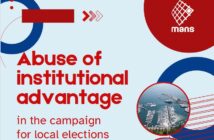TABLE OF CONTENTS
1. Introduction (PDF) download >>>
2. Chronological Sequence of the Cases Discussed (PDF) download >>>
3. Privatisation Agreements (PDF) download >>>
4. Level of Environmental Pollution (PDF) download >>>
5. Investments into the Environment (PDF) download >>>
6. The “Free” Access to Information Farce (PDF) download >>>
7. About MANS (PDF) download >>>
Free access to information is one of the cornerstones in the development of an accountable government and an efficient democracy on its path to the European Union and obliged to comply with the requirements stemming from the United Nations conventions.
The basic goal of the project within which this publication has been made is the use of legal mechanisms to make available to the public full information on privatisation decisions concerning the key state-owned companies made on behalf of the citizens by their elected representatives.
The procedure for exercising access to information is guided by the Law on Free Access to Information, the Law on General Administrative Procedure and the Law on Administrative Dispute. It involves the following steps: request for information, appeal to the second instance body, if there is such a body, complaint with the Administrative Court and motion for extraordinary examination of Administrative Court’s judgements by the Supreme Court.
The total of four persons were engaged on the project, and over 200 requests for privatisation information and over 50 appeals and complaints were filed in one year, while access to information was allowed in not more than 6% of cases.
The publication focuses on specific cases illustrating that ever since the Law on Free Access to Information came into effect, the relevant authorities keep persisting in endeavours not to impart information, thus making the whole privatisation process highly ‘un-transparent’.
Most of the cases refer to access to information on the privatisation of the Aluminium Plant Podgorica (KAP), the largest economic entity in Montenegro accounting for, prior to privatisation, some 10% of the total employment in Montenegro, around 20% of GDP and some 40% of total
exports. KAP is also the largest consumer of electric power accounting for almost 50% of total consumption, which eventually led to requests for the construction of a hydro-power plant on the Tara River, within the UNESCO World Heritage Site.
KAP is the largest water, air and soil polluter of the state declared in its Constitution as being ecological, and the existing data on impact of pollution to health of the population of Zeta Valley and Podgorica are not in the public domain. It is located in the immediate vicinity of the National Park Skadar Lake, one of the largest bird habitats designated as a Ramsar Site.
Although by announcing a public tender for the sale of 65% of the state-owned shares the Government sought a strategic investor, on 27th July 2005 KAP was actually sold to a British off shore company “Eagle Capital Group”. The owner of that company is another off shore company, Cyprian this time, “Salomon Enterprises”, allegedly also the owner of the Russian Russal. After signing the agreement, “Eagle Capital Group” changed its name into “En Plus Group” and moves their headquarters from Virgin Islands to British island Jersey. According to the press, in addition to the purchase price of 48.5 million euros, the new owners have undertaken to invest another 55 million, and the additional 20 million into the environment. The full KAP privatisation agreement was declared a business secret.
This publication also includes a case of an institution which is in charge of concluding privatisation agreements claiming not to be in the possession of the KAP Purchase and Sale Agreement, as well as a ministry not holding the document for which they staged a public discussion.
On a specific case, we showed the effects and the results of endeavours for the free access to information, where the same institution first declared the pollution data a business secret only to publish it after a criminal complaint has been filed.
The publication contains some evidence that some of the documents defining the obligations of the new KAP owner regarding investments into the environment amounting to some 20 million euro differ both in terms of measures envisaged and the investment schedule.
The examples presented here, the transcripts of video and audio recordings, indicate that certain authorities allow inspection of documents only, as one form of access to information, thus preventing imparting information. After MANS has invoked the principles and standards contained in the international human rights treaties stipulating that the right of access to information includes the freedom to seek, receive, but also impart information, the Supreme Court’s decision changed the jurisprudence in such cases and confirmed the obligation on the part of public authorities to enable access to information in the manner requested.



